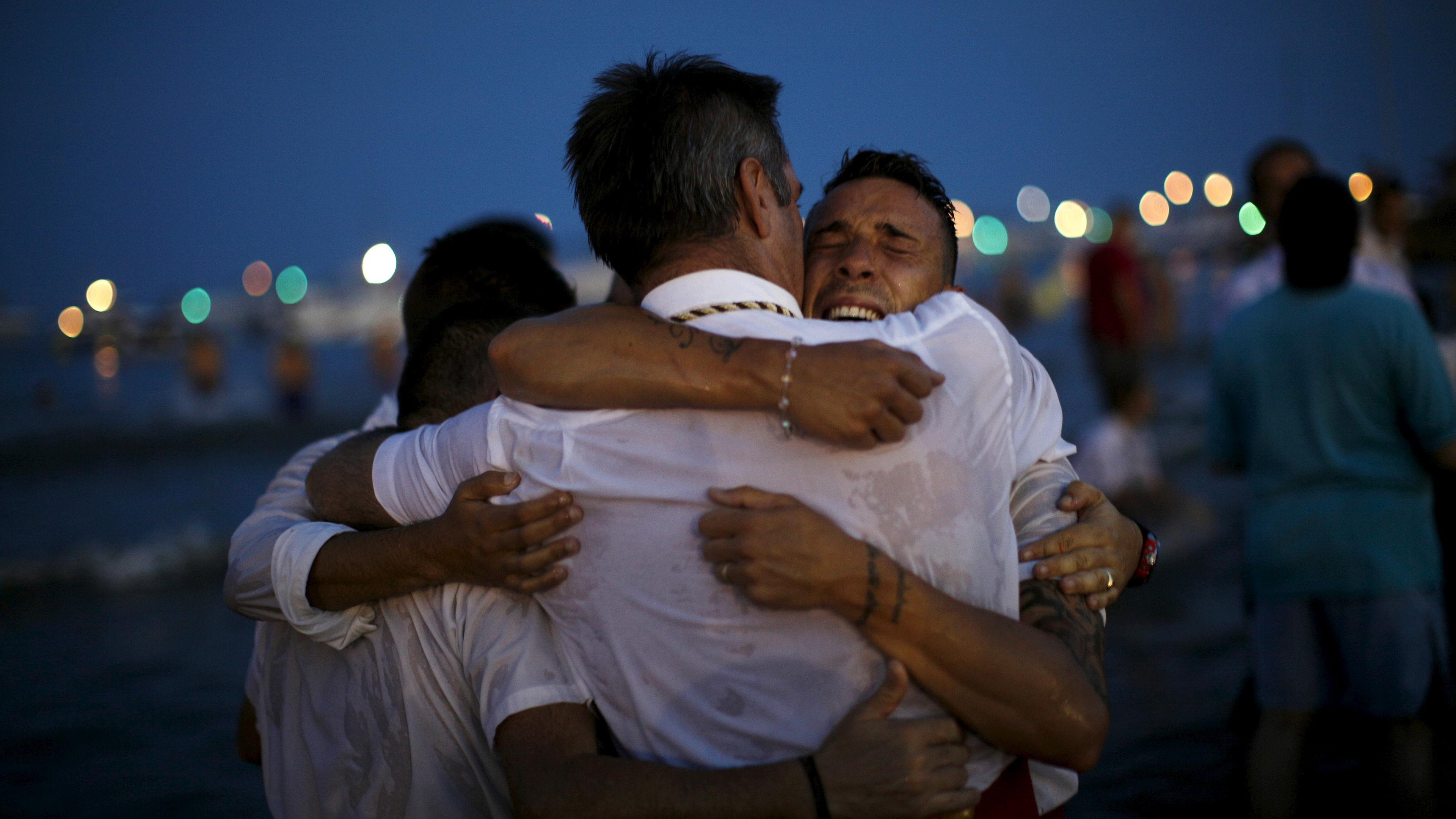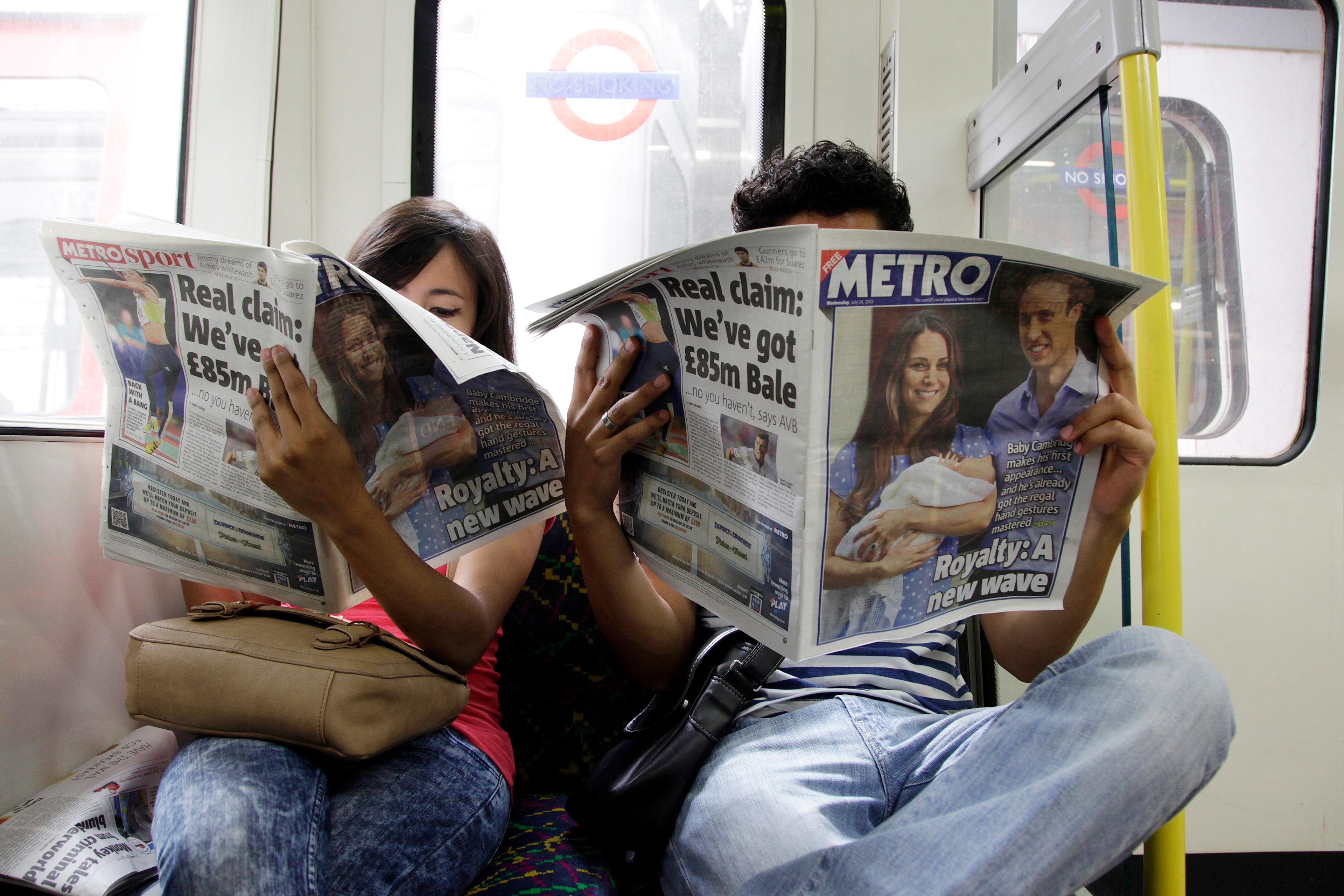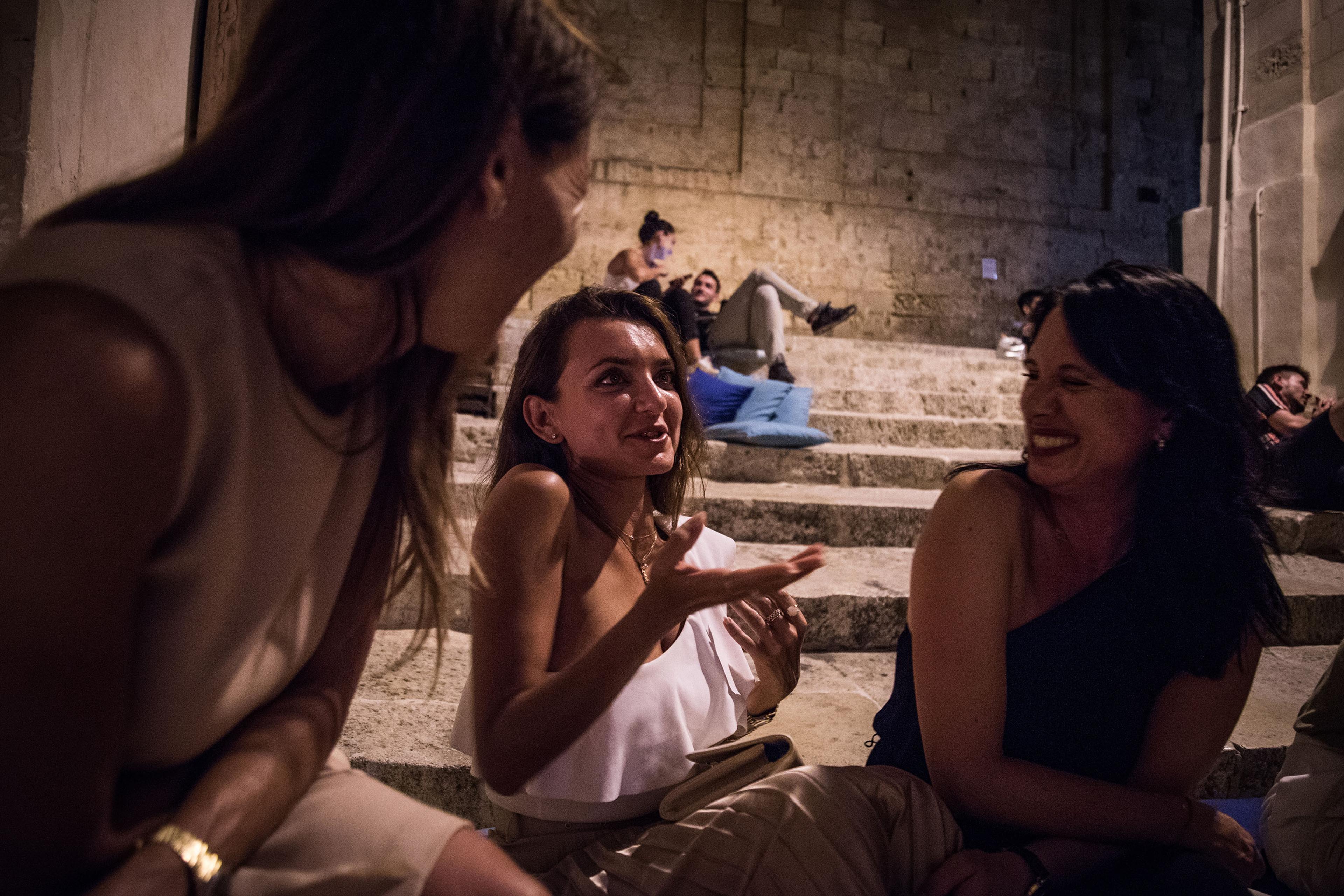‘I get sad at weddings, but not for the reason you might think. When I see the groom with his best man, I can’t think of any man who knows me well enough to fill that role.’ Lawrence, 32, is one of more than 500 class- and race-diverse men in English-speaking countries whom I’ve canvassed on the subject of intimacy and friendship over the past two years. A software engineer in Hawaii, Lawrence wishes he had more close friendships with men, but even initiating a coffee feels like a risk: ‘With a woman, you can be like: “Hey, let’s go to the park, let’s get a coffee.” With a man, it’s like, will he think I’m gay or something?’
Another interviewee, Kieran, 40, a white primary school teacher from Ireland, said he regrets fumbling his chance to offer support to a friend, Sam. Over drinks at the pub, Sam confided to Kieran that he struggles with an anxiety problem. Kieran’s immediate reaction was: ‘Don’t embarrass yourself.’
Kieran hadn’t ever heard male friends his age talk about their mental health conditions. Ill-equipped to meet the moment, he stumbled through until the conversation switched back to one of their ‘on table’ topics: sports, politics and work.
On his way home from the pub, Kieran realised that Sam’s experience mirrored something he had felt himself, though he had never been able to name it ‘anxiety’ until he heard another man say it out loud. But the moment to ease Sam’s shame, and disclose his own struggles, had already passed.
Ranging in age from 23 to 95, the men I surveyed answered questions about the nature of their intimate connections. Were they satisfied with their social support network? Who does their support come from? Is there anything – or anyone – missing? Such questions are timely. Recent research indicates that one in five men in the US and one in three men in the UK lack close friendships entirely. Two-thirds of young American men say: ‘No one really knows me.’ Nearly half of men in the UK feel they cannot confide in a friend about their problems. American men are 50 per cent less likely to report receiving social support – having someone check in on them or offer help when they need it – in a week than women, and also report having fewer friendships than they did 30 years ago. But it is the quality of men’s bonds, measured against the human psychological need for deep social connection, not necessarily the number of their friendships, that paints a gendered picture of social deprivation. What men often lack is not friends, but closeness.
High-quality, close friendships involve intimacy, the fragile closeness born of risking ourselves and being met with acceptance and belonging. This kind of closeness can evade men in environments that operate on norms of indifference or active hostility towards expressing what is happening in their inner worlds. Luis, 31, a Latino primary care doctor in California, touched on this indifference when he told me about the time he shared the painful story of a breakup over a meal with his childhood friend Andrés. ‘That sucks, man,’ Andrés responded, but then had nothing else to say. Bids for support are not always met with the willingness or emotional competence required to provide what many men are looking for.
Navid, 44, a Persian American business coach, spoke about being mocked as a teenager by his friends for expressing affection toward other boys. For a look that lingered too long or a pat on the back that seemed more a stroke than a thwack, ‘they called me a faggot,’ he said, recalling the all-purpose signifier for any behaviour deemed ‘too feminine’. Later, when someone in his circle made similar attempts at physical or emotional affection, Navid caught himself flinging the same word at them. ‘If I’m calling you that, there’s no way I can be it,’ he explained. It’s a hallmark of how men surveil each other’s behaviour: the punished becomes the punisher.
Many men rely centrally on the women in their lives, even when these women do not rely centrally on them
In the pub, at school, in the office or on the sports field, men in most Western societies (though growing research suggests these dynamics are not geographically confined) are asked to perform a masculinity that values self-sufficiency and disdains emotional ‘oversharing’, especially with other men. This process is learned. For every commentator who suggests that boys are simply less community-minded and relationally intelligent than girls, there is a study that shows how boys are incentivised, through subtle and overt cues, to hide their sensitivity until – like any muscle that is not used – it atrophies. The US psychologists Christopher Reigeluth and Michael Addis spotlight such cues in their research on the policing of masculinity. One 17-year-old white boy in their study put it this way:
I was just, like, depressed all the time. And my friend called me ‘a depressed little bitch’. And it really got to me because I had just lost my grandfather … When he said that to me, I learned to hide how I was feeling.
In my own work, Navid demonstrates the protracted consequences of this social learning process. Taught to retract his bids for connection, or risk mockery, he said: ‘I didn’t know how to have intimacy with anyone I’m not sexually attracted to,’ alluding to the one place – or person – many men turn to for softness and intimacy.
Over and again, men expressed a chronic sense of lack within their male friendships. When I asked Eagle, 44, a mixed-race school administrator from Arizona, if he had close friendships, he replied: ‘Do you mean outside of my wife?’ looking confused. Eagle sought male friends but, like many other men, he found that ‘friendship with men is a lot of activity and discussion about what is happening, and never really exploring your inner world.’ Jared, 40, felt similarly: ‘I wish it was easier to make friends and keep friends as a guy, but I think it’s easier to self-disclose with women.’ Women, he added, ask better questions and remember to follow up. As Kenneth, a white 28-year-old in Canada, put it: ‘Women offer me actual relationships, whereas men just offer me experiences.’
Many men in my work rely centrally on the women in their lives, even when these women do not centrally rely on them. George, 24, a mixed race engineer in the UK, said: ‘My only social outlet apart from work is being with my girlfriend, and maybe mixing with her friends as well.’ Ed, 82, said: ‘I wouldn’t know what to do socially if my wife died.’ The idea that only women can provide nurturing companionship creates a fraught context for reciprocal relationships between men and women.
Few interviewees ever question whether they are, in one man’s words, a ‘leech’ on women’s time. One group was an exception: queer and trans men – who often sit furthest from the top of the masculinity hierarchy. This group was often acutely aware of how women in their lives – not just romantic partners, but friends, family members and colleagues, too – were heavily relied upon for a type of emotional support that my colleague and I call ‘mankeeping’. Paul, 28, a Latino American gay man, finds himself caring for women friends who are burnt out by supporting their straight male romantic partners. ‘When straight men fail, we have to pick up the pieces,’ he said. He recommends that straight men ‘diversify who [they] communicate to. You can’t just rely on your wife or girlfriend to be your emotional labourer.’
Alao, 33, a Nigerian gay man, put it more bluntly: ‘Straight men have a lot to learn from us.’ For him, the casual tenderness and care often seen in same-gender male relationships shouldn’t be confined to the queer community. Trans men echoed this perspective, drawing from their unique vantage point of navigating masculinity while remembering their previous girlhoods or womanhoods. ‘As a man with a girlhood, I’m confident in expressing vulnerable needs,’ said Liam, 28, a graduate student in New Jersey. He added that friendships with cisgender men often feel like ‘a step down in intimacy’. These relationships could be richer, he believes, if cisgender men risked sharing their own ‘vulnerable needs’, and also learned how to meet that need in others.
For straight, cisgender men courageous enough to leave behind the masculine norms that restrict intimacy with other men, much awaits. Quincy, 38, a former US Army combat medic, started a friendship group for Black men in Phoenix, Arizona, when he noticed that there were no opportunities for men to meet in his area outside of sports or professional networking. ‘The first thing we had to do was actually learn how to be good friends,’ he said, noting that, while getting willing men together in a room was easy, learning empathy and active listening meant leaving outdated notions of manhood behind. Similarly, for Nem, 40, a Black actor in London, years of working against masculine defaults meant giving up the urge to be each other’s masculine saviours: ‘We can finally stomach each other’s stuff without having to find a solution.’ The impulse to fix, rather than to feel, often leaves men stuck in patterns that limit connection, meaning the first step to closeness is often unlearning the default practices of interacting with other men.
Take João, 30, a mixed-race man living in London, and his best friend Abilo, in São Paulo, who have learned to simply ‘be’ in each other’s presence without needing an activity or agenda. The two straight men grew closer in their 20s, when Abilo was completing military service in Brazil and João was ending a long and significant romantic relationship. Both wrestled with emotional difficulties and relied on each other daily. João told me: ‘Nothing nears what we have.’ They meet in person only twice a year now, but each phone call ends with: ‘I love you, see you tomorrow.’ When João returns to Brazil, the two of them lie on the couch, Abilo’s legs draped over João’s while they are deep in discussion. They walk arm in arm down the streets of São Paulo.
The men who had close friendships with other men struggled less with their mental health
American best friends Basil, 30, and Alex, 29, start their conversations with unconventional endearments. ‘Hello, you beautiful kumquat,’ Basil sometimes says, to which Alex responds with: ‘Hello, my perfect cinnamon roll.’ Friends for a decade, it took them years to converse openly about ‘how we were really doing,’ Alex told me. ‘When I started to let him in slowly,’ Alex said, ‘it was like he saved me.’ When I asked what he had been saved from, he responded: ‘I felt like I could actually invest in someone who wasn’t my partner. There was another person who actually cares about me.’ Honouring their regular check-in by phone was among the strategies they used to cultivate closeness – even saving it as an event in the calendar so they wouldn’t miss it. They started to welcome long silences during their walks or drives, realising it made them both feel at ease. They became more curious about each other – actually voicing, not just noticing, when the other seemed off. Ten years on, their weekly check-in ritual contains jokes, information, life updates, sadness, pain, playful weirdness. ‘We feel safe enough to share all of it,’ said Basil.
Like João or Basil, the men I interviewed who had close friendships with other men struggled less with their mental health, and reported happier partnerships with women, than the men who relied solely on a romantic partner. Across medicine and the social sciences, compounding evidence shows that having friends with whom we can share our problems serves to modulate the body’s stress response. ‘The people who turn out to be the happiest and the healthiest are those who have good, warm connections to others,’ Robert Waldinger, the director of the Harvard Study of Adult Development, said in a TED talk in 2022.
We have, as a society, always demanded bravery from men. But so many are still lost when it comes to the bravery that close relationships demand. I think about Kieran, about Lawrence, and wonder what would happen if they took a different kind of male ‘risk’ – the kind that Basil and Alex, or João and Abilo, took when they worked to cultivate a friendship of complete range and stunning comfort. What if Kieran had apologised to Sam that night in the pub and shared his own experience of anxiety? What if Lawrence bit the bullet and asked another man out for coffee? This is the kind of bravery men need right now – the courage to be known.








